Between Social Justice and Egalitarianism
No Nigerian citizen needs a soothsayer to acknowledge the fact that justice in this country is for the rich. This piece explores in brevity, the various ways through which social justice is denied the ordinary citizens of this country.
Justice and Social Justice
Justice is a common good that should be enjoyed by just men. The Oxford advanced Learners Dictionary sees justice as “the fair treatment of people”. Justice does not take into account, social status, as rightly affirmed by Thomas Acquinas when he defined justice as the “firm and constant will to give to each one his due”. Nwosu (2011:177) defines justice as “the indispensable precondition for peace and harmonious co-existence among men, as well as respect for the dignity of other people”. The term and modern concept of social justice was coined by Jesuit priest, Luigi Taparelli in 1840 based on the teachings of Thomas Acquinas.
Equity/Egalitarianism and Rule of Law
Equity means the equal treatment of everyone. Egalitarianism is seen as a system where class struggle is neither evident nor emphasized, while rule of law depicts equality of all men before the law. This means according justice to whom it is due.
Social Justice and Rule of Law: the Nigerian Situation
In the area of governance in Nigeria, social justice is not given credence. The people do not enjoy the proper dividends of our democracy. The power sector is barely functional, the educational institutions are inadequately funded – which is the bone of contention in the present FG/ASUU dispute, our health infrastructures are dilapidated. The most striking of these is that our leaders are very much aware of the entire malady, if not; they would not be sending their children to study abroad or travel abroad themselves for medical treatment. They themselves have totally lost faith in our indigenous education and health systems. In every fiscal year, huge sums of money are set aside for every government ministry and parastatal, at times running into surpluses, yet salaries are being owed, as ministerial projects are hardly carried out. The billions of dollars pumped into the power sector are far from being commensurate with the level of success achieved. It’s either the monies were siphoned or low quality materials and quack contractors were used.
In developed countries, a social security is maintained for unemployed and old people while Nigerians who painstakingly employ themselves are chased out of their jobs. Oh yes! A governor comes to power and announces that okada riding is banned and that keke has been endorsed, the poor masses dump their motorcycles and buy keke. Another comes in and bans the keke that was initially endorsed by his predecessor thereby gaining nothing absolutely in making life difficult for his subjects. Contract fees are inflated in Nigeria – with an unofficial and undocumented fifteen percent of the fee going into the coffers of the client. Methods of recruitment into jobs in this country have been bastardized. Tribalism, nepotism and ‘godfatherism’ have all taken front page in the minds of the employers, thereby sacrificing merit on altar of mediocrity. If an Hausa man is a foreman or at the helm in any government parastatal and ten thousand jobs are advertised, be sure that about five to six thousand of the total employees will be Hausa and then followed by job racketeering. Same applies to other ethnic nationalities.
In the Nigerian judiciary, ‘the devil has occupied a bed’. It is dangerous to be arraigned before a Nigerian court as a non-politician or a lower class citizen because you MUST be convicted. They indulge in justice racketeering as justice goes to the highest bidder. How come all our prison inmates are lower class, poor and impoverished people? No president, governor, senator, house member, minister, commissioner, LG chairman or their sons and daughters. They will never go to prison. I am convinced that they either have a special court and judge or they do not commit crime. Even when they commit, the immunity clause protects them. If some are ‘mistakenly’ indicted and jailed, they immediately gain state pardon. Someone who steals a handset is prone to be jailed, but one who embezzles government fund is free. The same policemen who arrest a handset thief also join in the convoy of a governor who steals state allocation. A taxi driver who fails traffic law is bound to lose some money to police extortion officers, but a government car or a colleague who fails same law goes unpunished.
Yet, we have celebrated fifty years of our independence on bomb ruined day, and are still making plans to celebrate the hundred years of our abysmal existence. What on earth are we even celebrating? Are we celebrating that fifty years ago there was injustice in the country and today there is justice?
The government has not played on principles when viewed from the angle of the percentage of the national budget that goes into education. The United Nations Organization recommends that twenty-six percent of every national budget be channeled into education funding. Education has suffered under funding in the country over years. Education has continued to suffer lack of prioritization, yet the immediate past president was a teacher, the present president was a teacher, the minister of education is a teacher and so many others.
A greater percentage of the national budget is derived from the Niger-Delta and yet it remains poverty stricken. Unemployment is on the increase in that region which has led to internal insurgency by the youth of the region. It is not a matter of ‘bring your gun and I will give you money’. The government knows what to do to quell the uprising. The country is so rich that they can give all the children of that region free education and give jobs to their unemployed.
Lack of social justice and rule of law have hampered our national development – politically, economically, technologically and socio-culturally. It has rather heated up the polity and set up inter-ethnic and inter-religious rivalries, through which costly infrastructures are destroyed. Social justice is simply, justice exercised within a society, particularly as it is applied to and among the various social classes of a society. A society that is deemed socially just is one that is based upon the principle of egalitarianism or social equality. A socially just society values and maintains human rights.
But alas, the elements mentioned above are not evident in Nigeria. We truly need a national overhaul. There should be a paradigm shift. We need a mind orientation and reorientation in Nigeria, which would be more fruitful if it starts from the family unit. The introduction of civic education into our education system is a bold step. We need to stop adhering to the realist theory of justice, which believes that justice is the interest of the stronger and for the rich. ‘All stakeholders must stake their hold to hold up what is right’. I think that with a just and egalitarian society, a conducive and an enabling environment would have been created for development.
______________________
Chukwuezi Eunan Osinachi wrote in from Umuakama, Nduhuobokwe, Uzoagba-Ikeduru LGA. 08137214414,
Read also Related Posts
Comments
comments

 ODI: Protesters barricade East-West road – Demand FG’s obedience of court order
ODI: Protesters barricade East-West road – Demand FG’s obedience of court order
 THE TEN ‘I’s THAT BREAK THE HOME (13)
THE TEN ‘I’s THAT BREAK THE HOME (13)
